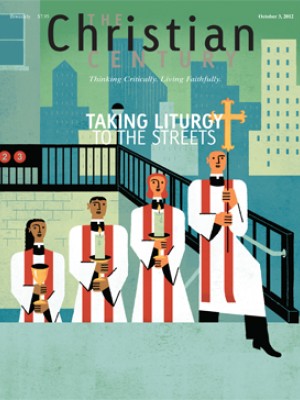Serious faith
To my mother’s chagrin and in spite of her relentless efforts, I did not read books as a child. I read only baseball box scores. Then Edvart Rolvaag’s Giants in the Earth captivated me in high school, and I’ve been reading books ever since.
I loved Marilynne Robinson’s novels Gilead and Home, with their wise and sensitive portrayals of faith, church, family and aging clergy. Usually when religion appears in fiction and particularly when that religion is Christianity, it is presented as simplistic, treated as a cliché and dismissed. Many best-selling works suggest that religion is a waste of time at best and toxic, anti-intellectual and violent at worst. When I saw that Robinson had published a new collection of essays, When I Was a Child I Read Books, I immediately ordered it.
Read our latest issue or browse back issues.
In reviewing the book in the Century ("When I Was a Child I Read Books by Marilynne Robinson"), Peter Boumgarden said that Robinson’s book “offers a model for engagement with science, policy and the humanities by an author who takes these fields as seriously as she does her faith.” I’m impressed by how seriously Robinson takes her Christian faith. She is learned in history, biblical scholarship and theology. And she is a Calvinist. While Calvin and Calvinism are popularly understood as the burden of the lifelong Presbyterian, or are misunderstood and trivialized, Robinson knows and appreciates Calvin.
In an earlier collection, The Death of Adam, she explains that she titled one piece “Marguerite de Navarre” because no one would have wanted to read about its true subject: Calvin. Marguerite, the sister of French king Francis I, was learned in philosophy, a patroness of religious reform and influenced by Calvin. As Robinson wrote, “Anyone interested in American history knows that Calvin exerted as important an influence on it as anyone. . . . People know to disapprove of him, though not precisely why they should.” Robinson reminds her readers that Calvin “wrote theology of breathtaking beauty and tough mindedness.”
I was surprised and delighted to encounter Calvin again and again as I read Robinson’s new essays. In one of them, “The Human Spirit and the Good Society,” she even refers affectionately to “good John Calvin,” who rejects “the frigid dogma of Aristotle.”
In the midst of a political revival of Ayn Rand’s radical individualism, Robinson pointedly observes that it sticks in the craw of “new American ideologues” that “America has never been an especially capitalist country. The postal system, the land-grant provision for public education, the national park system, the Homestead Act, the graduated income tax, the Social Security system, Medicare, Medicaid, the G.I. Bill—all of these were and are massive distributions or redistributions of wealth meant to benefit the population at large.” The whole point of state universities, she contends, “has been to create an elite so large the name no longer serves, to create a ruling class that is more or less identical with the population.”
Robinson sees in the law of Moses “a recurrent, passionate insistence on bounty or liberality, mercy and liberality, on being kind and liberal, liberal and bountiful.” Her essay “Wondrous Love” is one of the best pieces I’ve ever read on what is good, beautiful and important as well as politically, socially and economically relevant about Christian faith.
She also forced me to rethink my smug dismissal of the old hymn “In the Garden” as hopelessly narcissistic. Referring to Mary Magdalene tarrying in the garden with Jesus, Robinson says: “Epochal as the moment is, and inconceivable as Jesus’s passage from death to life must be, they meet as friends and rejoice together as friends. This seems to me as good a gloss as any on the text that tells us God so loved the world, this world, our world.”






